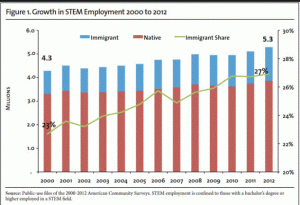A 2016 published report by the National Academies of Sciences, Engineering and Medicine, does a good job in debunking the notion that immigrants are taking American Jobs. Immigrants do not take American jobs in life science & pharmaceuticals but quite simply they are raising competency and skill standards.
There are plenty of STEM jobs that go unfilled and this means that employers simply won’t lower their standards for the sake of making a hire, American or not. When they do make a hire they want all options available for best talent and prefer not to settle. Just because you are US born doesn’t mean you should be given preferential treatment. The most skilled and capable applicant should be awarded the position.
We need to move on from the small-mindedness of protectionist practices as they hold us back and spur mediocrity. Competition forces us to get better.
A bit of Yesteryear Fear Mongering (Still alive and well unfortunately)
In this 500+ page report led by Francine D. Blau, economics Professor at Cornell she stated:
“We found little to no negative effects on overall wages and employment of native-born workers in the longer term.”
In the last two decades, the number of immigrants in the country increased 70 percent to about 43 million people; they are now 13 percent of the population. One in every four Americans is either an immigrant or the child of one. And since 2001, about one million immigrants have come legally to the United States each year.
Foreign born workers are raising the bar in competing for top jobs. And while there may be enough STEM graduates from American Universities each year,many of the American born student’s are not ranking as high as their immigrant competition.
. The attitude from Silicon Valley is that a lot of the U.S. talent, while bountiful in number, just doesn’t stack up.
Silicon Valley won’t come out and say this, since it will sound offensive to American-born grads. So Silicon Valley argues that there’s a general STEM shortage where there really isn’t one. In fact, the forces of supply and demand for foreign and domestic talent seem to be working ok according to this Science magazine piece.

This trend should give pause to America’s primary school leaders. We simply need to do a better job of training students for secondary education. This means doubling down in STEM subjects and engaging kids at an early age. Our secondary education system and universities for their part need to train individuals for real jobs, not just hypothetical ones. Yes, America can compete but only when complacency is removed from our educational system.








